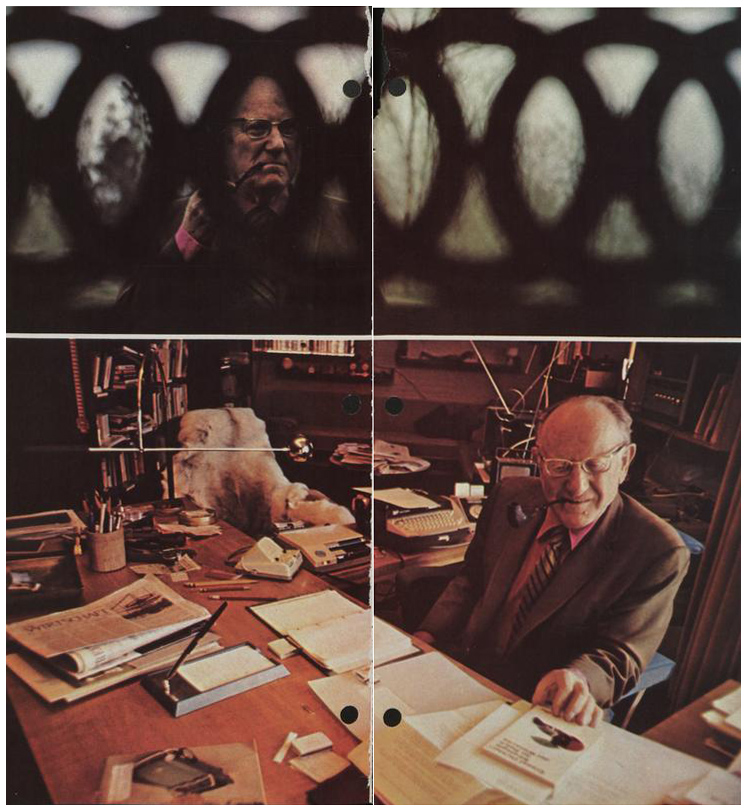Since they became a part of Hagley Museum and Library’s collections in 2008, the Ernest Dichter papers (Accession 2407) and the accompanying Ernest Dichter photographs and sound recordings (Accession 2009.226) have been a valuable resource for scholars studying late 20th-century consumer behavior and changes in the marketplace.
In 1946, after leaving positions with the advertising agency of J. Stirling Getchell, Inc. and the CBS Network, Ernest Dichter (1907-1991) founded his own consulting firm, the Institute for Motivational Research, which became a pioneer in the developing field of consumer motivational research.

Dichter specialized in the "depth interview" approach, in which samples of target consumers were subjected to a battery of psychological tests and psychoanalytic analysis. He used this method to provide services to a wide range of clients in the United States and Europe. Dichter also released a number of newsletter-style serial publications about his work and research, including the Human Factor: Ideas on the Art of Motivating People.
We’re pleased to announce today that much of this collection has become increasingly accessible to the public, with the addition of nearly 1,500 new items to our Digital Archives’ Ernest Dichter collections. These recently added items offer a broad selection from the ‘Research Proposals and Reports’ series of the Ernest Dichter papers, and date from the mid-1950s to the late 1960s.
The digitized material includes a large number of studies the Institute for Motivational Research did in partnership with The New York Times publishing company for ‘The New York Times Grocery Workshop’, a years-long project in which Dichter partnered with the publisher to conduct consumer research into grocery-shopping habits. The publisher then provided this publication to food advertisers and producers to induce them to advertise in The New York Times and incorporated the studies into its own editorial practices with the goal of expanding readership, especially among women.
These digitized studies also track notable and changing social and political phenomena of their time, such as changing sexual mores, environmental legislation, expectations about gender in the studies of male and female consumers, the rising importance of young consumers to advertisers, and businesses' fears and desires about the risks and rewards of courting the dollars of black consumers. Many of these issues are also addressed in the company’s contracted work with municipalities and nonprofit organizations, as in the case of the Institute for Motivational Research’s work for New York City’s Commission on Intergroup Relations. This report explored discriminatory practices in the city’s housing market, public accommodations, and general population.
The Institute for Motivational Research also took on explicitly political clients. In many cases, these were on behalf of political campaigns, as in the case of the unsuccessful 1958 senatorial campaign of Claude Pepper (1900-1989) in Florida. In other cases, the work was broader in scope, such as with the company’s 1965 work for the National Federation of Conservative Organizations, which sought out Dichter’s assistance in using advertising appeals to reinvigorate Americans' interest in and support for politically conservative causes.
There’s room for fun in these studies too! See the August 1958 file on the “Problem Analysis and Proposal for a Motivational Research Study aimed at Increasing the Popularity of the Crew Cut.” The proposal, pitched to the Lucky Tiger Manufacturing Company—a manufacturer of men’s hair products—offered a study that would help create “effective appeals to young boys and their parents; to teenagers; to college men” in “getting an increasing number of males to wear crew cuts.”
Likewise, while it may seem that the company’s breadth of experience across a wide range of consumer and sociopolitical issues should have prepared Dichter and his employees for anything, one product seems to have flummoxed and surprised even them. While most proposals and reports succeeded in diplomatically assessing the new product’s relative market popularity, the seafood manufacturer Dulany Foods was told in unusually frank terms that their desire to launch a product line of tuna hot dogs was ill-advised.
Based on research that revealed a “high degree of confusion, hesitation and disbelief” regarding the product, the company was counseled to “drop the product; because of confusions and uncertainties as to what it is, as well as flatly negative attitudes on the part of a sizeable proportion of our sample,” or, failing that, turn it into another product entirely.
But wait… there’s more! To explore all that the Hagley Digital Archives has to offer, head over to digital.hagley.org. To visit the digitized Ernest Dichter collections directly, go to digital.hagley.org/Dichter.
Skylar Harris is the Digitization & Metadata Coordinator at Hagley Museum and Library
